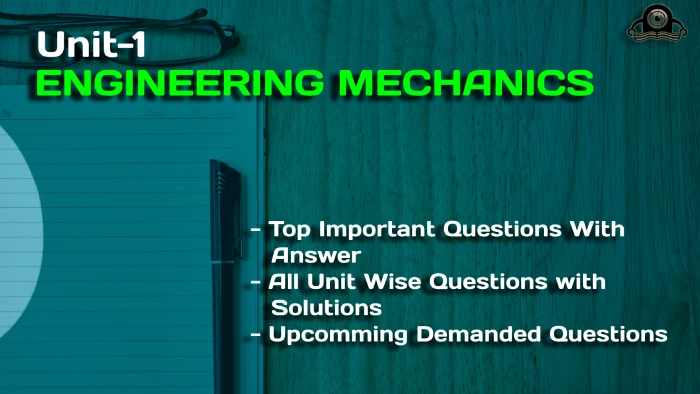Engineering Mechanics Unit 01 focuses on the subject’s introduction. The fundamental ideas of mechanics and how they apply to engineering are covered in this lesson. The unit’s Important Questions are intended to aid students in comprehending the foundational ideas of mechanics, including force, moment, equilibrium, and trusses.
Dudes 🤔.. You want more useful details regarding this subject. Please keep in mind this as well. Important Questions For Engineering Mechanics: *Unit-01 *Unit-02 *Unit-03 *Unit-04 *Unit-05 *Short-Q/Ans *Question-Paper with solution 21-22
Q1. Define free, fixed and forced vectors.
Ans. i. Free Vector: Free vectors are vectors that can be moved anywhere in space parallel to their position as long as their magnitude, direction, and sense do not change. Free vector is shown in Fig. (a).
ii. Fixed Vector: A fixed vector is one whose starting point is fixed. Figure (b) displays a fixed vector.
iii. Forced Vector: Forced vectors are those that can be applied anywhere along their path of motion. A forced vector is depicted in Fig. (c).



Q2. Two forces P andQ are inclined at an angle of 75°, magnitude of their resultant is 100 N. The angle between the resultant and the force P is 45°. Determine the magnitude ofP and Q.
Ans.
1. The resultant R of P and Q is given by,
2. The inclination of R to the direction of the force P is given by,
3 Putting value of P from eq. (1.4.2) in eq. (1.4.1), we get
Q3. What are the basic laws of mechanics ?
Ans. Following are the basic laws of mechanics:
i. Newton’s First Law of Motion: Every body remains in a condition of rest or uniform motion along a straight line, according to this theory, unless it is forced to alter its state by an external force operating on it.
ii. Newton’s Second Law of Motion: It asserts that the rate of change of momentum in the direction of motion is directly proportional to the net external force applied on a body in that direction.
iii. Newton’s Third Law of Motion: It asserts that there is always an equal and opposing reaction to every action.
iv. Gravitational Law of Attraction: According to this law, two bodies will be drawn toward one another along their connecting line by a force that is inversely proportional to the square of the distance between their centres and directly proportional to the product of their masses.



where, G = Universal gravitational constant of proportionality
Q4. The force system applied to an angle bracket is shown in Fig. Determine the magnitude, direction and line of action of the resultant force.



Ans. Given: Fig.
To Find: Magnitude, direction and line of action of the resultant force.
1. Considering the equilibrium of force system, we have









Resultant will act at a distance 4.36 m from point O towards B and it will lie outside the frame.
Q5. Two smooth spheres each of radius 100 mm and weight 100 N, rest in a horizontal channel having vertical walls, the distance between which is 360 mm. Find the reactions at the points of contacts A, B, C, and D shown in Fig. below.



Ans. Given: r = 100 mm = 0.1 m, W 100 N, l = 360 mm = 0.36m
To Find: Reaction at A, B, C and D.
1. From Fig., we have









Q6. Write down the laws of friction
Ans. Following are the laws of friction:
1. Friction operates against the surface’s desire to move in the opposite direction.
2. As long as the surface is at rest, the force applied to it equals the force of friction.
3. The normal reaction between two surfaces and the limiting frictional force have a fixed ratio.
4. The shape and area of the surfaces in contact have no bearing on the limiting frictional force.
5. When the two surfaces are moving, the ratio of limiting friction to normal reaction is a little bit lower.
6. The sliding speed has no effect on the friction force.



Important Question with solutions | AKTU Quantums | Syllabus | Short Questions
Engineering Mechanics Quantum, Syllabus, Important Questions
| Label | Link |
|---|---|
| Subject Syllabus | Syllabus |
| Short Questions | Short-question |
| Important Unit-1 | Unit-1 |
| Important Unit-2 | Unit-2 |
| Important Unit-3 | Unit-3 |
| Important Unit-4 | Unit-4 |
| Important Unit-5 | Unit-5 |
| Question paper – 2021-22 | 2021-22 |
Engineering Mechanics Quantum PDF: | AKTU Quantum PDF:
| Quantum Series | Links |
| Quantum -2022-23 | 2022-23 |
AKTU Important Links | Btech Syllabus
| Link Name | Links |
|---|---|
| Btech AKTU Circulars | Links |
| Btech AKTU Syllabus | Links |
| Btech AKTU Student Dashboard | Student Dashboard |
| AKTU RESULT (One VIew) | Student Result |

4 thoughts on “Unit 01 Introduction In Engineering Mechanics Important Questions.”